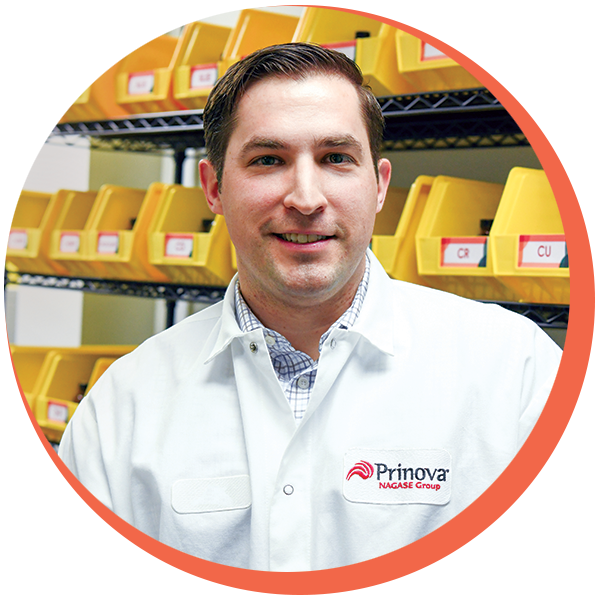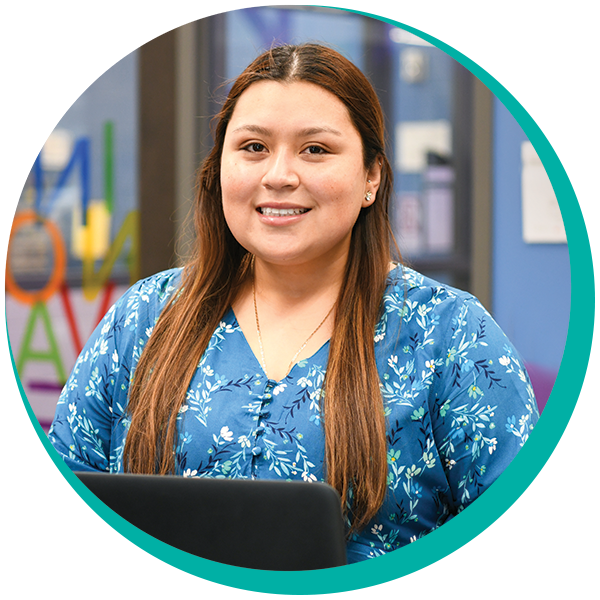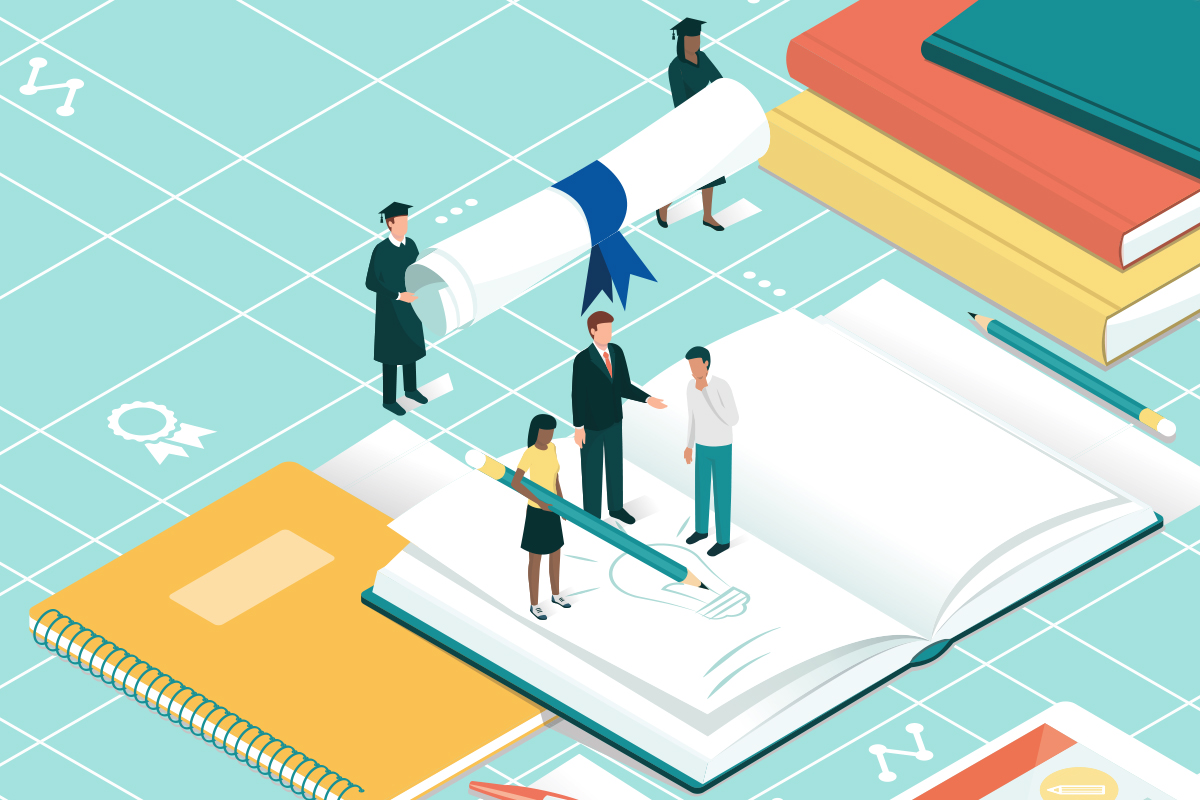Building on Student Success
A New Center, More Advisors, and a Jumpstart When Students Struggle
Student success has always been at the core of Aurora University. It’s been a long-standing tradition to help students recognize their own potential, discover what matters to them, and achieve success in life and work.
But “student success” as a movement is a relatively new idea in higher education. At its core, success involves keeping students enrolled and moving toward graduation in a timely manner and graduating not only with a degree but with the skills to succeed in a career or advanced study.
As the challenges to earning a college degree have multiplied in recent years in no small part due to the wider issues facing young adults — the pandemic, the rising cost of education, student debt, culture wars, and political upheaval — AU has responded.
Within the past year, the university has forged new student success initiatives aimed at fulfilling the promise of a richer future for AU students. The university reorganized its administrative structure to expand the concept of student success and take a holistic approach to serving students. AU increased its mental health offerings to 24/7 access, hired more academic advisors, added new career services, created a program that connects students with alumni working in their fields, enhanced data analytics for tracking outcomes, and opened a new building dedicated to student success.
“At AU, student success means meeting students where they are, walking alongside them, and responding to what’s going on in their world and in society,” said Jennifer Buckley, AU’s senior vice president for student success. “We embrace the students’ goals as our goals. Students are at the center of everything we do.”

January Jumpstart
As the fall 2021 semester got underway, it became clear to professors and advisors that students needed help. Some students were having difficulty taking notes in class, managing their time, or sitting for exams. Others were struggling with anxiety and depression. Some students simply had gotten out of sync balancing their part-time jobs with their academic studies.
“We were in a president’s advisory council meeting sharing with each other what we were hearing from students, and these themes started to emerge,” said Buckley. “After 18 months, it was clear that the pandemic was taking its toll on our students. We all just connected the dots and decided we needed to do something.”
AU’s student success team took action and within two months created a series of virtual workshops designed to teach the skills vital to college success and to help students return from winter break recharged and ready to succeed.
The online series “January Jumpstart. Start Strong. Stay Strong.” ran for three days prior to the start of the spring 2022 semester. The 12 one-hour virtual workshop topics, taught by AU faculty and staff, addressed the needs students had identified through surveys and focus groups. Topping the list: managing stress and anxiety, improving study skills, landing internships, setting goals, and building connections on campus.
January Jumpstart was an instant hit. It attracted 2,155 students — more than half of the undergraduate population. Ninety-eight percent of students reported the sessions prepared them for the second half of the academic year.
A majority of students said the workshops made them feel more confident in particular when it came to taking class notes, organizing their day, and using Handshake, an interactive platform that allows students to search for jobs and internships as well as connect with employers.
Students had the opportunity to earn a $500 tuition credit by completing three tasks: participating in three separate January Jumpstart workshops, registering for the spring 2022 semester, and completing the workshop exit survey.
To cover the cost of the tuition discount, AU tapped into the federal Higher Education Emergency Relief Fund for COVID-19. In total, AU awarded the participating students more than $1 million in pandemic-related financial aid.
“Coming out of the pandemic, the needs of the students had shifted, and we responded quickly to those needs,” said J. Andrew Prall, AU’s vice president for academic affairs. “This is where AU excels — creating a culture that always puts students first and caring about their future with a singular focus.”
I want other students to know there’s always a way to figure things out.Ximena Cortez ’17
Feeling ‘Normal’
No matter which workshops the students attended, a common theme emerged, according to the post-workshop surveys. The students liked connecting with others like them who were having similar experiences. They appreciated hearing how their peers felt about handling stress and anxiety, taking exams, and looking for a job. Sharing conversations about what they were all going through made them feel ‘normal,’ many students said.
“One of the really exciting things to come out of January Jumpstart was the engagement between students in each session,” said Buckley. “It was inspiring to see the students responding to one another and creating community.”
Some of the specific ways students said the workshops helped them included developing coping strategies, creating an action plan, learning from other students, and discovering untapped campus resources.
Christian Alday ’23, a junior majoring in Mathematics/Secondary Education, attended workshops on healthy lifestyle choices, study skills, and time management.
“January Jumpstart was helpful because it gave me some good ideas for making the spring semester less stressful,” said Alday. “The workshops helped me figure out new ways to organize my days and achieve my academic goals.”
Sophomore Martha Cruz ’24, who is also majoring in Mathematics/Secondary Education, said the sessions helped her improve her note taking, time management, and overall confidence. “The skills I was taught will forever help me in school,” she said.
The workshops boosted students’ tenacity and determination. Students expressed an overwhelming improvement in confidence and preparation for the upcoming term. Many students asked AU to make the workshops a regular event before the start of each semester. And, indeed, the student success team is already working to reframe new-student orientation to include similar sessions.
“We expect January Jumpstart to improve student retention rates, graduation rates, and academic achievement,” said Buckley. “While it’s easy to talk about student success best practices, it takes dedicated intentionality to implement them. It’s really an uncharted world for this generation of students. That means we at AU have to be agile, and it presents today a greater challenge then we’ve ever had.”

Giving the Gift of Time
One of the most effective and often overlooked resources to advance student success at colleges and universities is alumni. In an initiative aimed at meeting students’ needs for career support, AU created the Sundays @ 7 Career Conversations with Alumni, an occasional Sunday evening panel focused on career and graduate school topics.
The Sundays @ 7 program taps AU’s network of more than 41,000 alumni, connecting AU students with working professionals. The live, virtual forum allows students to hear from AU alumni about their transitions from college to careers, learn firsthand about the daily details of specific jobs, and gain insights into how to apply to graduate school, including law school or medical school. Students also discover the steps to building their own professional networks.
“Recent graduates are sharing their experience, advice, and wisdom,” said Teri Tomaszkiewicz, senior vice president for alumni relations and career services. “We are excited for our students to network with alumni in this way, and we look to expand these opportunities as we continue to fulfill our promise to students.”
Since the Sundays @ 7 program launched in fall 2020, alumni from a wide swath of careers from across the country have taken time to talk to current students about the twists and turns of their own AU experience — from changing majors to finding internships to eventually navigating the job market.
Speakers have included an analytics manager, athletic trainer, attorney, clinical research project manager, community health worker, family doctor, graphic designer, high school principal, investment officer, lab technician, library social services specialist, marketing manager, physical therapist, recruiter, surgeon, tax specialist, travel nurse, and veterinarian, to name a few.
Participating alumni have hailed from a diverse mix of companies such as Apple Inc., Aya Healthcare, Chicago Cubs, CMC Materials Inc., Meta Platforms Inc. (formerly Facebook), Edward Hines Jr. VA Hospital, Equifax Inc., Heineken N.V., Molson Coors Beverage Company, Newell Brands, Opportunity Finance Network, Rush Copley Medical Center, St. Jude Children’s Research Hospital, U.S. Department of Justice, Women’s National Basketball Association, and Zurich International.

“While it would be really cool to give a big donation and have your name on a building or athletic field, time is something everybody has the ability to give,” said Ray Kosmicki ’09, vice president of food safety, quality and regulatory affairs at Prinova USA, where he oversees 85 employees around the globe. Kosmicki took part in a Sundays @ 7 event this past September. He told students about his career journey from wanting to be a lawyer when he first arrived at AU, to then switching his major to Health Science, then getting accepted into pharmacy school, and finally finding his niche at Prinova, a food flavor manufacturer and global food ingredient distributor based in Hanover Park, Illinois. He wants AU students interested in health science to realize that there is a bounty of health science jobs that don’t necessarily require going to medical school.
“When you’re a student, it can be challenging to understand what you can do for a job after you graduate,” said Kosmicki. “I had no idea food science even existed when I was a student.”
Kosmicki completed his MBA at Loyola University Chicago last year and is looking to establish a pipeline for new and future AU graduates to fill internships and job positions at Prinova. He also plans to take part in a new health science ambassador program at AU that allows AU graduates to shadow professionals working in the field.
“There are lots of ways to have a great impact and contribute to students’ success,” said Kosmicki. “We all have the ability to give back our time, experience, and knowledge to develop the future leaders of tomorrow.”
‘AU Helped Me Get Through My Struggles’

Ximena Cortez ’17, who majored in Computer Science, is a software quality assurance engineer at San Jose, California-based Cisco Systems Inc. She is passionate about promoting diversity and helping underserved communities find the right resources — a focus she shared with students during a Sundays @ 7 session last October.
As a Latina working in computer science, Cortez didn’t have many role models. She struggled her first year at AU juggling a two-hour commute to campus each way, a restaurant job, financial hardship, and immigration issues. With the help of AU professors, student coaches, and financial advisors, she was able to secure a grant and scholarship, quit her restaurant job, and focus on her studies.
Her grades went up. She got more involved on campus as a Spartan ambassador and peer advisor. She also joined the board of AU’s Latin American Student Organization and with the help of AU staff started an organization for undocumented students interested in going to college.
“I want other students to know there’s always a way to figure things out,” said Cortez. “What turned it around for me when I was at AU was getting involved on campus. It got me out of my comfort zone and made me realize I can do it. AU helped me get through my struggles. I feel very connected to AU and am full of gratitude toward my professors.”
For Kim Rios ’11, it is important to tell AU students that graduating from a small private school has its advantages.
“I want students to use me as a resource,” Rios said. “I love talking to people about what I do, and I want to help students see what’s possible.”
It’s one reason Rios participated in the Sundays @ 7 program from Spain, where she is stationed as a judge advocate in the U.S. Navy Judge Advocate General’s Corps. Rios majored in Political Science and English at AU before earning her law degree from DePaul University College of Law in 2014.
“One of the worries I remember having when I was at AU is that not a lot of people had heard of AU, and that it would be hard to be competitive for jobs or graduate school,” said Rios. “But, in fact, it was a plus for me. The JAG Corps is purposeful about hiring people with diverse backgrounds and from diverse settings, from small and big schools.”

Wells of Inspiration
Giving students a place to go to envision their dreams is an essential part of student success at AU. The Kimberly and James Hill Center for Student Success, which opened last year, provides the environment for students to build their future.
The 7,000-square-foot building on the southwest edge of campus offers a place for students to receive career guidance, meet employers, and prepare to enter the workforce. Students can practice mock interviews, get a professional headshot taken, and find free, work-appropriate clothing for interviews and internships.
Next door is the Wackerlin Center for Faith and Action, where students can go to reflect on their vocation and purpose and walk the outdoor labyrinth.
A third building — a Learning Commons — is planned to be located next to the Hill Center. The three-story Learning Commons will be a highly interactive and flexible space for accessing digital resources, seeking academic support, studying in groups, and socializing between classes. Together with the Hill and Wackerlin Centers, it will support a growing array of student success initiatives.
Meanwhile, faculty continue to play a key role in encouraging and guiding students. Student success in the first year at AU relies on a comprehensive student orientation and the personal attention of faculty and academic advisors to help students choose a major and plan their coursework so they can graduate on time.
Students are at the center of everything we do.Jennifer Buckley, senior vice president for student success
“What distinguishes AU is the sense of community we have here,” said Matthew Kneller, associate professor of communication and director of general education. “Everybody feels we are on the same team, that we are all behind the students. We are all very good at working with students to strike a balance between developing the academic expertise of a specific major and the professional skills needed to adapt to the dynamic and changing job market we live in today.”
The required First Year Experience course, for example, helps students make the transition into college. Students take a set of surveys to help them identify their strengths, interests, and values, and they learn about student life activities that can enhance their success. Junior Mentoring, another required course, helps students build professional skills and prepare to enter the workforce or graduate school.
For the past two years, Spartan Summer, a program created in 2021 in response to the pandemic, has offered select courses at no charge to help students stay on track for graduation, prepare for licensing exams or graduate school, acquire more skills, or explore a new area of study. AU’s summer school program can also speed time to a degree as well as support students needing help meeting the academic rigors of university life.
While it is still early, AU is showing positive signs in the key student success metrics of retention and graduation rates. The outcomes for total undergraduate enrollment, the freshmen-to-sophomore persistence rate, and the six-year graduation rate improved in the 2020–2021 academic year compared with 2019–2020.
But there is still more to do.
“The reality is that nobody in my generation has experienced what our students have experienced,” said Prall. “In the past two years, they have been faced with a global pandemic, challenges to our democracy, social injustice, cultural upheaval, and growing concerns about climate change. As educators, it’s a moment that calls for great humility. We can meet the moment in terms of student success by listening carefully to our students.”